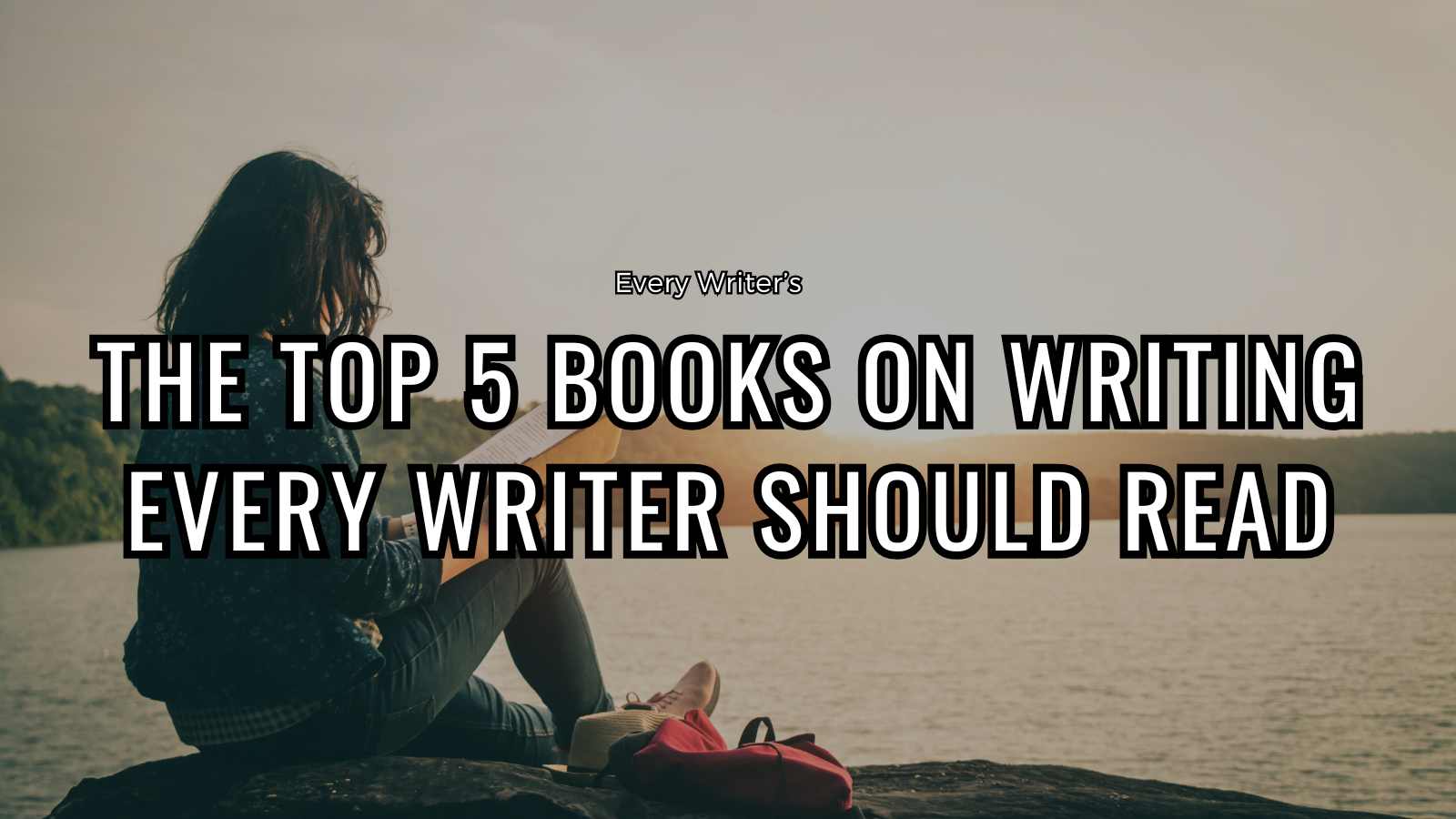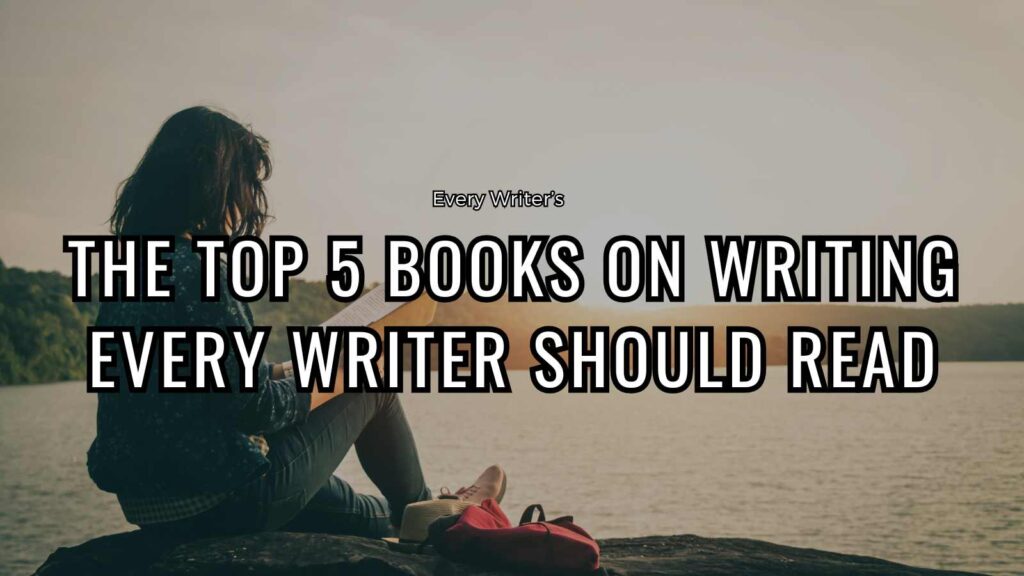The Top 5 Books on Writing Every Writer Should Read
Disclaimer: This article contains affiliate links. If you purchase products through these links, I may earn a commission at no additional cost to you. I only recommend products I personally value and believe will benefit you on your writing journey.
As writers, our craft demands continuous growth, learning, and refinement. Throughout my journey as a writer, I’ve turned to countless books on the craft, but three have fundamentally transformed how I approach writing: Stephen King’s “On Writing,” William Zinsser’s “On Writing Well,” and Steven Pressfield’s “The War of Art.” Each reshaped my understanding of writing in different ways—King through his practical toolbox and personal journey, Zinsser by teaching me to eliminate clutter, and Pressfield by helping me recognize and overcome creative resistance.
These life-changing books, along with two other essential titles, form what I consider the ultimate writing craft library. While there are hundreds of books about writing, these five have stood the test of time, continuing to inspire and educate generations of writers. Whether you’re just starting your writing journey or looking to refine your skills after years of practice, these books offer timeless wisdom that can elevate your work to new heights.
Let’s explore these five essential books that every serious writer should have on their shelf.
1. “On Writing: A Memoir of the Craft” by Stephen King
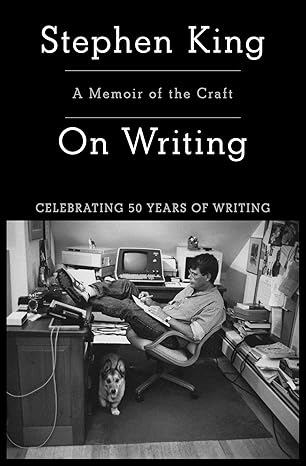 King is number one on my list, and for good reason. On Writing: A Memoir of the Craft is an amazing look into the mind of a master craftsman. Part memoir, part writing guide, “On Writing” offers a unique blend of personal history and practical advice that taught me how to look at writing in an entirely new way.
King is number one on my list, and for good reason. On Writing: A Memoir of the Craft is an amazing look into the mind of a master craftsman. Part memoir, part writing guide, “On Writing” offers a unique blend of personal history and practical advice that taught me how to look at writing in an entirely new way.
What makes this book special is its hybrid format. The first half follows King’s journey from childhood to established author, including his near-fatal accident in 1999. The second half delivers his no-nonsense advice on the writer’s craft. This structure allows King to show rather than just tell—we see how his own principles shaped his phenomenal career.
The most valuable takeaway for me was King’s “toolbox” concept, where he breaks down the essentials of good writing into practical tiers of skills every writer needs. His advice on “writing with the door closed” (first drafts for yourself alone) and then “writing with the door open” (revisions with readers in mind) revolutionized my approach to drafting and editing.
King’s straightforward style cuts through the mystique of writing, making the craft accessible while still honoring its complexity. His famous advice to “read a lot and write a lot” seems simple, but his explanation of why this matters is profound.
This book is especially valuable for fiction writers, aspiring novelists, and of course, King fans. However, writers of any genre will find his insights on discipline, craft, and the writer’s life illuminating. If you only read one book about writing, make it this one.
2. “The War of Art” by Steven Pressfield
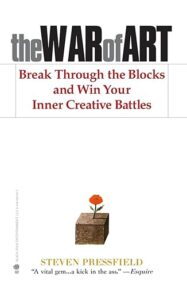 If King taught me the craft, Pressfield taught me how to show up for it. “The War of Art” inspired me to approach writing and creative work in a completely new way. This isn’t just a book about writing techniques—it’s a battle plan for creative warriors.
If King taught me the craft, Pressfield taught me how to show up for it. “The War of Art” inspired me to approach writing and creative work in a completely new way. This isn’t just a book about writing techniques—it’s a battle plan for creative warriors.
What makes Pressfield’s work so powerful is his unique framing of creative struggles. He introduces the concept of “Resistance” (always with a capital R), personifying all the internal forces that prevent us from doing our creative work. By naming this enemy, Pressfield gives writers the ability to recognize and combat the invisible barriers that keep us from reaching our potential.
Reading this book makes you feel like an invincible artist. Pressfield’s own story is inspiring, but his direct, almost militant approach to creative discipline is what truly transforms readers. His concept of “turning pro” mentally—approaching your art with the same dedication a professional brings to their job—fundamentally changed how I structure my writing life.
While many writing books focus on technique and style, “The War of Art” addresses the psychological challenges that other craft books often miss. It dives deep into why we procrastinate, self-sabotage, and abandon projects—then offers concrete strategies to overcome these universal struggles.
This book is essential for writers battling procrastination, self-doubt, or creative blocks. If you’ve ever found yourself cleaning your entire house instead of sitting down to write, or if you’ve abandoned more projects than you’ve finished, Pressfield’s wisdom will speak directly to your experience. Even established writers return to this book regularly for its motivational power.
3. “On Writing Well” by William Zinsser
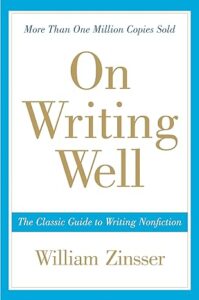 I first encountered Zinsser’s “On Writing Well” early in my writing development while in BGSU’s BFA in Creative Writing program. This book taught me to be tight with my writing as a young writer, and I credit it with helping me learn control—perhaps the most difficult skill for enthusiastic new writers to master.
I first encountered Zinsser’s “On Writing Well” early in my writing development while in BGSU’s BFA in Creative Writing program. This book taught me to be tight with my writing as a young writer, and I credit it with helping me learn control—perhaps the most difficult skill for enthusiastic new writers to master.
In my experience, writers typically struggle with one of two problems: flow or control. Zinsser is masterful at teaching the latter. If you love Ernest Hemingway’s crisp, economical prose, you’ll appreciate the method Zinsser teaches. His approach to eliminating unnecessary words, focusing on clarity, and writing with purpose resonates with Hemingway’s famous iceberg theory—where the power comes from what’s left unsaid.
Though primarily focused on nonfiction, the principles in “On Writing Well” apply universally to good writing of any kind. Zinsser breaks down the components of clear, effective prose with examples that demonstrate the transformation from cluttered to clean writing. His chapters on eliminating clutter and the concept of unity in writing are particularly valuable.
What makes this book stand the test of time is how Zinsser practices what he preaches. The book itself is a masterclass in clarity and concision. There’s no wasted space or inflated language—every word serves a purpose, just as he advises his readers.
This book is especially valuable for nonfiction writers, journalists, and essayists, but fiction writers will also benefit enormously from its lessons on precision and clarity. For any writer who tends toward verbosity or struggles to get to the point, Zinsser’s guidance is transformative.
4. “The Elements of Style” by William Strunk Jr. and E.B. White
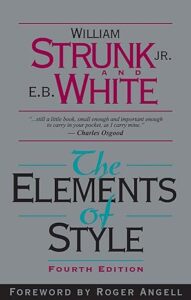 No collection of writing books would be complete without this slim, powerful volume that has guided writers for over a century. “The Elements of Style,” often simply called “Strunk & White,” is perhaps the most influential writing manual ever published—and for good reason.
No collection of writing books would be complete without this slim, powerful volume that has guided writers for over a century. “The Elements of Style,” often simply called “Strunk & White,” is perhaps the most influential writing manual ever published—and for good reason.
Originally written by William Strunk Jr. in 1918 and later revised and expanded by his former student E.B. White (of “Charlotte’s Web” fame) in 1959, this compact guide distills the craft of writing into its essential elements. Despite its age, the advice remains stunningly relevant for modern writers.
What makes this book extraordinary is its brevity and authority. At around 100 pages, it manages to cover fundamental rules of usage, principles of composition, matters of form, and commonly misused words and expressions with remarkable clarity. Its famous directive to “omit needless words” is not just advice but a philosophy the book itself embodies.
The manual balances technical instruction with a deeper understanding of what makes writing sing. White’s contribution added a crucial element of style to Strunk’s original focus on grammar and usage, creating a perfect marriage of technical correctness and stylistic elegance.
Despite being over a century old, “The Elements of Style” remains essential because good writing still depends on the same fundamentals. Technology and trends may change, but clarity, concision, and correct usage never go out of style. This book provides the foundation upon which all good writing stands.
Every writer, regardless of genre or experience level, should own a copy. It’s particularly valuable for those looking to strengthen their technical skills or who need a trusted reference to resolve common writing dilemmas. Keep it on your desk—not your bookshelf—as it’s meant to be consulted regularly, not read once and forgotten.
5. “Bird by Bird: Some Instructions on Writing and Life” by Anne Lamott
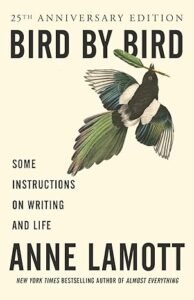 If the other books on this list teach you how to write well, Anne Lamott’s “Bird by Bird” teaches you how to be a writer—with all the emotional complexity that entails. This beloved guide stands out for its warm, conversational tone and disarming honesty about the challenges of the writing life.
If the other books on this list teach you how to write well, Anne Lamott’s “Bird by Bird” teaches you how to be a writer—with all the emotional complexity that entails. This beloved guide stands out for its warm, conversational tone and disarming honesty about the challenges of the writing life.
Lamott’s approach is wonderfully human. Rather than presenting herself as a flawless authority, she shares her own struggles, neuroses, and failures with self-deprecating humor. This vulnerability creates an instant connection with readers who recognize their own creative anxieties in her stories.
The book’s most famous contribution to writing advice is the concept of “shitty first drafts”—Lamott’s permission to write terribly at first just to get words on the page. This single idea has liberated countless writers from the paralysis of perfectionism. Her advice to focus on “short assignments” (looking through a one-inch picture frame) makes the daunting task of writing manageable for even the most overwhelmed beginner.
What makes “Bird by Bird” essential is how it addresses not just the craft but the psychology of writing. While other books tell you how to structure a sentence or plot a story, Lamott helps you navigate jealousy, rejection, self-doubt, and the host of other emotional challenges that can derail even the most technically skilled writer.
This book is particularly valuable for writers struggling with perfectionism, those just starting their writing journey, or anyone who has ever felt like an impostor in the writing world. It’s like having a compassionate, funny mentor who understands exactly what you’re going through and knows just what to say to keep you moving forward.
Conclusion: Your Complete Writing Craft Library
These five books complement each other beautifully to provide a comprehensive writing education. King gives you the tools and practical craft advice from a master storyteller. Pressfield helps you overcome the internal resistance that keeps you from using those tools. Zinsser teaches you to write with clarity and precision. Strunk and White provide the timeless fundamentals of usage and style. And Lamott offers the emotional support and perspective to keep you going when the writing gets tough.
Together, they address the technical, psychological, and practical aspects of writing in a way that no single book could. While there are certainly other valuable books on writing, these five form an essential foundation for any serious writer’s library.
I encourage you to invest in your writing craft by exploring these resources. The knowledge and wisdom contained in these five books can transform not just your writing but your entire approach to the creative process.
Which book will you read first? The answer might depend on your current writing challenges. If you’re struggling to show up consistently for your writing, start with Pressfield. If perfectionism is your biggest hurdle, Lamott might be your best first choice. But no matter which you choose, you’ll be taking an important step toward becoming the writer you aspire to be.
Additional Resources: Honorable Mentions
While the five books above form my essential writing library, several other excellent titles nearly made the list:
- “Save the Cat! Writes a Novel” by Jessica Brody – A modern classic that adapts Blake Snyder’s screenwriting methods for novelists, offering a clear structure for crafting compelling stories.
- “Writing Down the Bones” by Natalie Goldberg – Combines Zen meditation principles with writing practice to help you develop your voice and creative flow.
- “Story Genius” by Lisa Cron – Uses insights from cognitive science to help writers create stories that engage readers on a deep psychological level.
For specialized writing interests, consider:
- Screenwriting: “Screenplay” by Syd Field
- Poetry: “The Poet’s Companion” by Kim Addonizio and Dorianne Laux
- Memoir: “The Art of Memoir” by Mary Karr
The craft of writing is ever-evolving, and new voices continue to offer fresh perspectives. Whatever your writing goals, investing in these resources is investing in yourself and your creative future.
Remember, as an Amazon Associate I earn from qualifying purchases made through the links in this article.
- Science Fiction Quiz #1 - May 21, 2025
- Awakening All Five Senses: How to Write Descriptions That Come Alive - May 15, 2025
- Comment Contest: Win Promotion for Your Writing! - May 14, 2025
